Musician to Musician: The Manichean
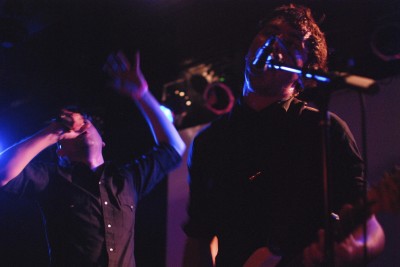 The Manichean are one of Houston’s bands on the rise. They first got onto my radar a few years ago, when I went and saw them at one of those hodgepodge showcases The Meridian was known for, and their brand of drama-rock was an instant success to me. I had to see them again to prove they were real. And then again, and again. They’ve gotten some good support from the Houston music scene, as well. Someone (Omar Afra, most likely) loves them at Fitzgerald’s/Summerfest, because they definitely get well-deserved high-profile shows there. So there is some “justice” in the world.
The Manichean are one of Houston’s bands on the rise. They first got onto my radar a few years ago, when I went and saw them at one of those hodgepodge showcases The Meridian was known for, and their brand of drama-rock was an instant success to me. I had to see them again to prove they were real. And then again, and again. They’ve gotten some good support from the Houston music scene, as well. Someone (Omar Afra, most likely) loves them at Fitzgerald’s/Summerfest, because they definitely get well-deserved high-profile shows there. So there is some “justice” in the world.
This summer they toured the West Coast and released their latest EP, Sakura. On the horizon is LOVERS, a full-length album due out in 2012. Catch them Thursday night at La Carafe and Christmas Day at the grand opening of Walter’s in its new location (1120 Naylor). Here is my Musician to Musician interview with The Manichean.
Justice Tirapelli-Jamail: It is difficult to say exactly how or when The Manichean came to be. Atoms clashing, colliding and connecting on such waves of chaos and synchronicity can only come so close to a traceable origin. However difficult the task of finding a starting point may be, for you my dear friend Jason, I will try.
The journey that Cory [Sinclair] and I have been on, that which has become and will continue to grow as The Manichean, began some six eventful years ago, long before our voices ever danced in harmony. The year was 2006. I was a young boy, age of sixteen, and Cory a fresh-faced twenty-two-year-old. Though we had never met, we shared an affinity for Salsa DJs (pronounced “Dee-Yays”) who would mix the styles of salsa, early ’90s hip-hop, funk, and house. Our first encounter would occur at “Club Rompas,” previously located in South Houston and long-closed as of now.
As it would so happen, we were both there to see a national Salsa DJ — one of our mutual favorites — DJ Cucasalsa. After Cuca’s phenomenal performance, I found myself on the outside patio without any cigarettes. Being that Cory was the only seemingly English-speaking person there and with my Spanish not holding up as well as it had in elementary school, I asked him for a smoke and, being the terrible person that he is, he contributed to the delinquency and tobacco-use of a minor. We spoke of music, swapped influences and mutual interests, and before the night was over we decided to form a band. He started working at Empire Café to be closer to where I lived, I began attending school at St. Stephen’s Episcopal so that I could skip class easier and walk the mere six blocks between there and Empire to practice on his lunch breaks, and that’s how we got the name The Manichean.
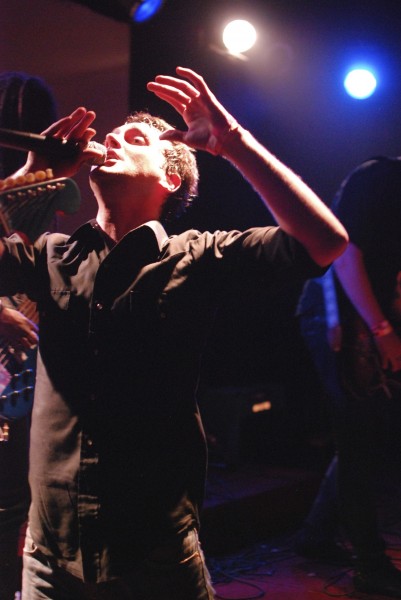 SCR: I’ve been a fan since about 2008 or early 2009. The first time I saw you was at The Meridian, which is long closed! When I first met you guys, The Manichean seemed to be only two people with a bunch of “helpers.” Is The Manichean songwriting process always Justice and Cory, or do you write as a full band more nowadays, with Sean [Spiller, guitarist] and the others making their input?
SCR: I’ve been a fan since about 2008 or early 2009. The first time I saw you was at The Meridian, which is long closed! When I first met you guys, The Manichean seemed to be only two people with a bunch of “helpers.” Is The Manichean songwriting process always Justice and Cory, or do you write as a full band more nowadays, with Sean [Spiller, guitarist] and the others making their input?
JTJ: The writing process of our songs has stayed the same as it has always been. I write the music, Cory writes the lyrics and spoken word, and with our powers combined we create songs together. I then teach these songs to our dedicated cast of musicians; Sean Spiller (guitar), Ash BigCash (bass), Dylan Tirapelli-Jamail (drums), Gustavo Roman (violin), and Cory Wilson (saxophone), without whom The Manichean would not be what it is today. They each play it in their individual style, put their own spin, or “Manichean stank,” as we like to call it, on what I give to them, and it becomes what you ultimately hear.
Another thing; when I first saw you guys, it was love at first sight for me. I won’t mention names, but it seems like friends I invite to see you guys have one of two reactions — they either really love or hate what you’re doing. And there is definitely a “WTF” factor when people see you, right? Does that seem true to you? Do you care about what people think of you, or just go about the business of making your art?
Cory Sinclair: This is a provocative question to answer, not because of the question, but because of the way I feel as though people view us. The only people who take us seriously are those that have seen us perform live, and to those that have neither seen nor heard us, we could just as easily be a concept or a discipline rather than a band.
I suppose what I’m trying to say is that I really appreciate the fact that we are highly misunderstood. I am equally fascinated with both people’s disgust and their reverence for us. And I know that we don’t always make the right decisions regarding our career or prospects, but we’re the ones making the decisions and creating the path we are on and goddammit, the music speaks for itself.
JTJ: I’d have to agree that what we do is rarely understood but I also see people that have a grasp of our intentions and a simultaneous distaste for it. I notice it in people both at shows and in passing conversation and it’s one of the biggest compliments you could give me, right up there with praise. A thorough hate for what we’re creating is almost if not equally as satisfying as a genuine love for it, because it’s eliciting an intense emotion. Cory and I don’t ever begin working on something with any question in mind aside from “Does this sound good to us?” We make music that we would want to listen to, and the fact that people connect to it, either on a positive or negative level, is really special.
Where do your dramatic between-song ideas come from? Are these pointed at anyone specific? You don’t have to say who…
CS: The transition pieces, or vignettes, all stem from my poetry, and my poetry has never been directed towards anyone in particular other than myself. Even the dialogue aimed towards someone else is actually discourse within myself, much like how “you are everyone in your dreams.” The content, however, is often about others, especially on our upcoming full-length.
Furthermore, the whole idea behind what we do is based upon theatre, so it always seemed natural, even necessary to provide highly malleable scene changes. LOVERS will probably have more of those spoken word sections than any of our other recordings… It’s cinema, you know; it’s cinematic.
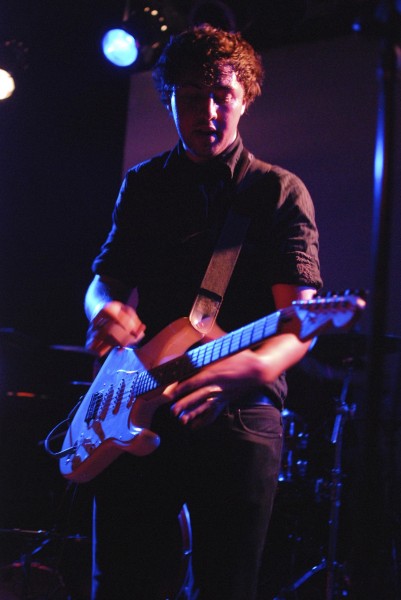 My favorite song of yours is “Lacerus.” Is that a common favorite among your fans? If not, then what song do people seem to request the most?
My favorite song of yours is “Lacerus.” Is that a common favorite among your fans? If not, then what song do people seem to request the most?
JTJ: Lacerus is definitely the closest thing we have to a “crowd pleaser.” People really seem to get off on that one, I think because it’s only three minutes long and not five to eight like most of our other songs. They can get all their ya-ya’s out and still have some stamina left afterwards.
CS: I think ‘Lacerus’ will be everybody’s favorite song of ours until they hear “The Swan.”
Tell me about your favorite guitar or bass and what amp do you use? Is there a reason you chose it or did it kind of choose you? I’d like to hear from Sean and Cash on this one, too.
JTJ: I’ve always loved old Gibson acoustics and Fender electrics. My baby is a 1967 Gibson J45 with a perfect, skinny neck that Ian Moore, a friend and phenomenal musician, rigged a _____ inside of. At almost every show, you’ll see me playing my electrics, though, a 2005 Mexican-made Fender Stratocaster and a 2011 Fender Jazzmaster. I’m running out of a custom Matchless amp right now but still looking for something different, I still haven’t quite found the sound I want.
Sean Spiller: My guitar is a hell-spun mixture of the bones of fornicators and the sinew of thieves and gluttons…it’s a custom Fender Jaguar. Oh, and the amp? 1965 Fender Tremolux. Destiny brought us together.
Ash BigCash: Mmmm, ’76 Fender Jazz Bass is my ax of choice. I has four basses and, sadly, none of them is that. I play out of Hartke speakers running through some old Canadian-made amp head. I would really prefer a Gallien-Krueger to the head I use now. Wink winks.
Favorite pedals or other gear you use? Have you thought about expanding your sound with more gear, or have you found a stopping point?
CS: I am fond of my Shure Beta 58A and my red XLR cable, purely for live performance.
JTJ: I have too many pedals, my favorites of which you see on my pedal board at our shows. I used to play with two full boards but I cut down from that rather significantly. I just love making strange, chaotic sounds, stuff that makes people in the audience scratch their heads trying to figure out. My favorite pedal is probably my Boss RV-5. Reverb makes me infinitely happy. I will never stop buying pedals.
ABC: Not that much, just a few pedals, really. I’ve got an MXR Carbon Copy analog delay, MXR El Grande bass fuzz, Aphex 1402 Xciter bass compressor, and I think I’ve got a bass wah, but I may have lost it or something.
SS: I’d love to expand, but I’ve been at a stopping point for about a year now. Those things used to be like crack to me, but I’ve settled down quite a bit. It’s hard to pick favorites, but I’d have to say my Boss DD-20 delay. She’s been by my side for five years now.
CS: Honestly, it was a real problem. He was consumed by it to such an absolute degree that he’d lost all control. Justice and I had to make an actual ultimatum at one point.
JTJ: It’s true. We told him, “Listen, Sean. If you don’t quit smoking crack you’re out of the band.” And that was it. Then the pedals became a problem for a little while, like the crack was to him, but he kicked that too.
CS: One of Sean’s infamous dark periods.
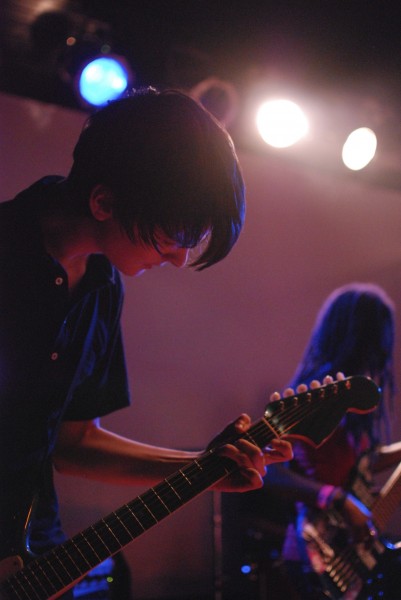 What are band rehearsals like with The Manichean? How do you even get seven or eight people to show up in the same place at the same time?
What are band rehearsals like with The Manichean? How do you even get seven or eight people to show up in the same place at the same time?
ABC: Confidential. You’ve got to join The Manichean if you really want to know.
SS: [laughs] Well, usually we practice on a Sunday, so I kind of liken it to going to church. Playing music with a group is sort of like a release for me, and there’s something spiritual about that.
Dylan Tirapelli-Jamail: Band rehearsals, in part, are what I would imagine any other band’s rehearsals are like. We get together, and we practice our songs. But on the other hand, our practices are not just a time for us to rehearse. They are a time for all of us to get together, and to “be” together. We talk about our day, share jokes, and just communicate. It is something beautiful that I would not trade for anything.
JTJ: They’re just being sweet so that our next practice won’t be four hours long. Jokes aside, and I know I can speak for Cory as well when I say this, we couldn’t ask for better musicians or better people to be in this with us. I get to have individual practices with everyone in the group, work out the parts one-on-one, and when we get together for group practices we just play through everything until it sounds better than it did before. Eventually it sounds good enough to show to everyone else. As far as the whole “getting seven to eight people to show up” thing, I have mass texts and carpooling to thank for that. I chose my car for its MPG and human capacity.
What is fun about playing in a large band? What makes it tougher?
CS: I think what’s fun about it is the spectacle. That was Justice’s idea. But it does often prove to be difficult, for various reasons. I’ve no idea how Tyagaraja does it with such success.
JTJ: Playing in a large band makes every show feel like a circus with us as the ringmasters, fueling the fire for some insane celebration, and that’s fun. But then playing in a large band makes miscommunication not only so much easier to occur but almost a mandatory thing, and that’s not fun.
DTJ: My favorite part about having a large band is having a bigger group of folks to call a family, you know? We joke, we laugh, and have a great time. Also, the fact that we have a wider variety of instruments provides us with a much larger sound, and much more diverse options in discovering our unique voice. There are two tough things, in my eyes, about having a large band. The first is that when playing a live show it is slightly more difficult for us, as apposed to a smaller band, to get a good live sound, being that we have more instruments to mix. The second is that, as Justice said before, it is somewhat difficult, not always but sometimes, to easily coordinate practices where everyone can attend.
SS: Yeah, I think having more people than your average rock band allows us to explore more things sonically. The only downside is finding a stage to accommodate us…but we haven’t let that stop us so far!
ABC: We are totally like a gang. Somebody’s always got my back. Time is precious when you’ve got this many people, and I know it’s been said a few times now, but yeah, getting together can be tough. We just make it happen, though. It all works out in the end. The +1 situation at shows can be tough, too. When you’ve got seven to nine people playing in one band, they tend to get a bit more careful with the guest list.
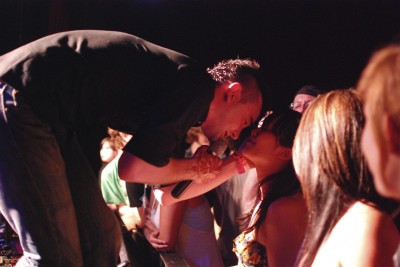 What are your favorite places to play, and your best gig or memory so far?
What are your favorite places to play, and your best gig or memory so far?
CS: Well, we haven’t played “TRON” yet, so… I’m still hoping for that one, but my favorite places to play are AvantGarden at Westheimer and Taft, shows put on by Free Press Houston, shows put on by the collaborative powerhouse of Mark C. Austin, Josh Applebee, and David Garcia, and the little ghost town of Bisbee, AZ… Dropping names, yo.
JTJ: Fitzgerald’s, upstairs or down, is always a blast. We never leave there without having a good time. Besides that, I’ve got to concur with Cory. Free Press Houston brings the house down; their showcases go consistently Gangbusters. We always feel loved playing at AvantGarden — it’s been nice to see Eric Dean bringing some noise back to that Westheimer/Taft corner, as well — and our Canned Acoustica showcase was an experience that completely took us out of our element. Town-wise, though, Bisbee takes the cake. I will move there one day.
Do you have any pre-show ritual?
CS: My pre-show ritual usually consists of worrying about things all day until focusing on getting into character just before the performance. It’s gotten better coz I get to share all the worry with my best friend Justice, and he takes care of me.
JTJ: My pre-show ritual consists of taking care of my best friend Cory while he worries about things all day until he focuses on getting into character just before the performance. Then I drink whilst taking care of everything that needs to be taken care of for the show. Then I just drink.
SS: No real ritual, all I need is at least two beers and a cigarette and I’m good to go.
DTJ: My pre-show ritual is fairly simple. I have a beer, or two, and then take out my practice drum pad and practice my rudiments until we play the show.
ABC: Dude, confidential!
Fitzgerald’s seems to be your “home turf.” What does it feel like to be on stage in front of a big crowd at Fitzgerald’s?
CS: It often feels like family… Or like performing inside a whale’s stomach, ribcage and all.
JTJ: It definitely makes me feel a bit woody.
CS: Did you just make a Pinocchio-based sex joke?
JTJ: …It’s called a Pi-joke-io.
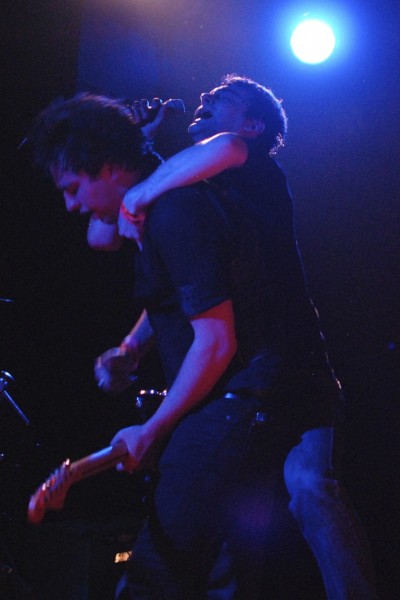 Do you tend to play the same set or do you change it up?
Do you tend to play the same set or do you change it up?
JTJ: We do our best to make each set different from the one before it. The songs and poetry are such that we can place them however we want, which leaves us with many possibilities. People may go to two shows in a row and hear many of the same songs but have the set feel completely different because of it.
Some performances Cory and I decide we want to be really intense and particularly loud, other shows we want to be prettier, more soothing, so we choose songs in our arsenal to accommodate the feeling that we’re looking for and pick certain spoken word pieces to connect them accordingly. Each set is based more on a mood or color than anything else.
CS: Because the songs and the poetry are so malleable, as mentioned before, we try to change the set to suit the situation or our surroundings. I also feel as though the set in general changes with the seasons.
How many songs do you guys have that you play fairly regularly?
JTJ: We have songs that we play at every show and some that we’ll set aside for months at a time or even longer before revisiting live. One of the songs we’ll be playing at our next show at La Carafe we haven’t performed — or even practiced — in over a year. Right now we’re focusing on showcasing tracks off our upcoming full-length, LOVERS, more so than anything else, but we still throw some older ones in there. We were talking about “Lacerus” earlier; we play that at every show. I’d say we have about eight songs that we’re playing regularly right now, cycling certain ones in and out depending on the set, and another 10 to 12 that we could play but choose not to.
CS: Yes, I figure many, with many others in reserve. But that’s really nothing compared to the amount of material that Justice and I have written that’s yet to be recorded or performed live. Most all of the things we are recording or focusing upon playing live now were written between one to five years ago, and now Justice and I are passively writing what’s supposed to be released two to three years from now… Infinite ammo.
What do you like about Houston? What can be better? Are you guys moving out or sticking around?
CS: What I like about Houston is its ability to provide me with the opportunity to be truly original, despite its oft-referenced “geographical drawbacks.” I am a child of the coast, the Gulf Coast, and we are the forbearers of shit others have yet to understand. We will always be a Houston band and we will always represent The City of Montrose, Houston, TX.
JTJ: Houston is like our great, big fucking secret. It’s full of everything you could want to see, hear, taste, and touch, and we Houstonians seem to be the only ones who know that. For now, that is…
Other favorite Houston bands and national bands?
CS: I have been moved in spiritual ways at the performances of Houston’s own Tyagaraja and Listen!Listen!. I have been cornered, breathless, and vulnerable by both Asli Omar of The Tontons and Gabriel Cavazos of American Fangs. And I have had sex whilst listening to albums by both Peekaboo Theory and Tax the Wolf.
JTJ: Listen!Listen! has been my favorite Houston band for the past four years or so, one of my favorites anywhere in the world, and they continue to leave me breathless with each new performance and release they grace this gray earth with.
Tax the Wolf is another one of my favorite local bands and my absolute favorite to share a bill because, to put it bluntly, those motherfuckers are just as crazy as we are. Fun fact! I have also had sex while listening to them. Other locals that kill me every time are Two Star Symphony, Tyagaraja, Female Demand, and B L A C K I E B L A C K I E B L A C K I E T H R E E T I M E S L I K E C A N D Y M A N.
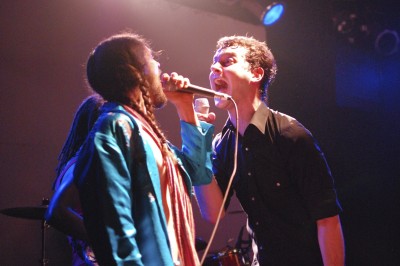 Favorite records of 2011?
Favorite records of 2011?
CS: Ah jeez, well, with complete disregard to when they were released… The Hazards of Love by The Decemberists, The Last Resort by Trentemoller, Diamond Eyes by Deftones.
JTJ: I, a nice, respectful young man, will follow with complete regard for your limitation to releases of this year… Except for my first one… ‘Dog’ by Listen!Listen!, Bon Iver by Bon Iver, Hawk by Isobel Campbell & Mark Lanegan.
SS: Helplessness Blues by Fleet Foxes, Bon Iver by Bon Iver, The Cradle by Colour Revolt.
ABC: Wounded Rhymes by Lykke Li, The Fall by Gorillaz, Legendary Weapons by Wu-Tang Clan.
DTJ: Pink Magick by Giraffes? Giraffes!, Bon Iver by Bon Iver, Zoo Weather [Ep] by Tera Melos.
Best gigs you’ve been to this year?
CS: Well, that’s easy: Free Press Summer Fest 2011 and The motherfucking Omar Rodriguez-Lopez Group at Fitzgerald’s Houston on March 21st, 2011.
JTJ: Oh, yeah. Free Press Summer Fest 2011 all the way. Also, Roky Moon & BOLT!‘s American Honey release sold me on them — their showmanship amps go to 11 — and Boyfrndz, this great three-piece out of Austin, their performance at the recent Montrose Winter Social knocked my damn socks off.
So far you’ve recorded at Sound Arts in Houston and now you’re in Galveston recording. What’s the place in Galveston called? How are you enjoying it? What has been the difference between Sound Arts and where you are now?
CS: It’s called The Cadillac Hotel, and it’s very much inspired by inappropriate scenes of dialogue from The Shining as well as the most famous lawyer from Houston, TX, and probably the world.
SS: It’s a beach house with a great view of the ocean. We did two weeks out there — separated by a month — where we would just wake up and record all day, mainly just guitars and some other instruments. No clock to watch or time restraints. Plus, Uncle Justice brought his whole bar down to make drinks for us daily. That was nice.
JTJ: I do what I can to help.
SS: We did track our drums at Sound Arts, though. We were adamant about getting a nice solid drum tone and knew that Brian Baker, the engineer, could get the sounds we wanted. We’ll be going back to Sound Arts sometime early next year to wrap up the tracking.
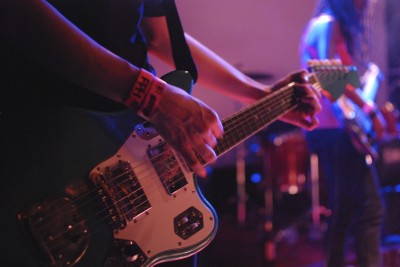 When is the Galveston recording expected to hit the streets?
When is the Galveston recording expected to hit the streets?
CS: Haha! When’s the next leap year?!… Oh wait, that’s this next year…
Are you planning another tour this year? West Coast again, or heading east?
JTJ: Right now we’re just focusing on the completion of our new album, LOVERS, which has turned out to be a big piece of work. It’s going to be a 15-track full-length with lots of strings and horns and Asian instruments and toy instruments and typewriters and wind chimes. It’s going to be slow and fast and acoustic and electric and pretty and ugly and if you cry while you’re listening to it then we will be happier than a clam on a bridge pea and will most likely drink your tears with big, child-like smiles. And once we finish and release this album, we will tour the West and East Coasts at the same time for the first ever Simul-Coast Tour. No one’s ever done it before. Then we’ll take over the world.
CS: Doesn’t sound that hard to me.
JTJ: Me neither.
CAN’T WAIT TO HEAR IT! END
(Photos: Cory Sinclair & Justice Tirapelli-Jamail; Cory Sinclair; Justice Tirapelli-Jamail; Sean Spiller & Ash BigCash; Cory Sinclair & fan; Justice Tirapelli-Jamail & Cory Sinclair; Tyagaraja & Cory Sinclair; Sean Spiller & Ash BigCash. All photos by Jason Smith.)



[…] in South Houston and long-closed as of now. As it would so … … Follow this link: SPACE CITY ROCK » Musician to Musician: The Manichean ← ASAP Rocky Jumps “In the Mix” [DJBooth Interview Exclusive] – Hip […]